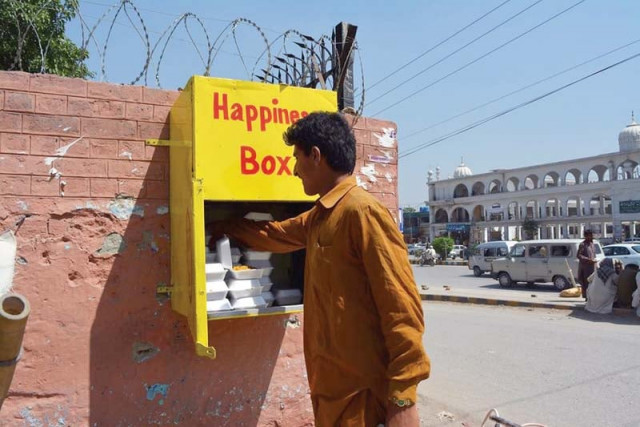A walk to remember: Box of Happiness offers free food twice a day
100 provided lunch, dinner on University Road

A box of happiness inscribed in a wall on University Road in the city. PHOTO: EXPRESS
With a smiley face emoji, the Box of Happiness holds 100 food containers during lunch and dinner for labourers and people who cannot afford a meal.
The initiative was launched by students of Institute of Management Sciences (IMSciences). Twice a day, they fill the yellow box with 100 meals. Biryani and kabuli pulao are usually on the menu. The meals are provided for free and without discrimination.
Modus operandi
Obaidullah, who heads the initiative, told The Express Tribune his team plans to expand the initiative to other parts of the city in future. He leads a five-member team, students, which also run a delivery service Darewroo, the Pashto termed for “just delivered”.
When asked why they do not to distribute food to labourers through a van service or motorbike since the box requires two trips—to be loaded for lunch and dinner—Obaidullah said they have only recently started working and are still trying to determine the most convenient means of distributing food among labourers.
“We will look into it after [receiving] feedback from them,” he said, “Only then will we be able to distribute the food through a van or on a bike.”
Obaidullah told The Express Tribune, “We do not take individual contributions [or donations],” he said. “[We want to make sure] what we do is sustainable with our own budget.”
According to Obaidullah, they will start requesting donations and contributions in future. He promised, “The initiative will bring smiles on the faces of labourers.”
Outside the box
Sunday afternoon, a large number of labourers gathered near the maroon walls. It was International Labour Day. However, for 40-year-old Aslam Khan, a daily worker, the day provided no cause for celebration. He squatted on a footpath, yards away from the Box of Happiness, wiping the sweat off his forehead.
“I regularly get my food from the box,” he said. “[I manage to] save R200 each day.” Aslam said the free food was a blessing in disguise.
However, he said the city did not even offer shade for free to labourers like him to protect themselves against blazing heat.
“The government should reserve a shaded area where labourers [can sit and wait for customers],” he said. “It is hard to bear the scorching heat of Peshawar.”
Shafiq Gigyani, a rights activist, said the box and the Wall of Kindness in the city depict the city’s humanity.
Gigyani said the Box of Happiness was a positive initiative which ought to be promoted and encouraged.
He said K-P is always in the crosshairs of militants and such humanitarian services show how collective efforts can alter the fate of underprivileged sections of society.
“The initiative shows how [people] serve those in need,” he added.
Published in The Express Tribune, May 2nd, 2016.













COMMENTS
Comments are moderated and generally will be posted if they are on-topic and not abusive.
For more information, please see our Comments FAQ